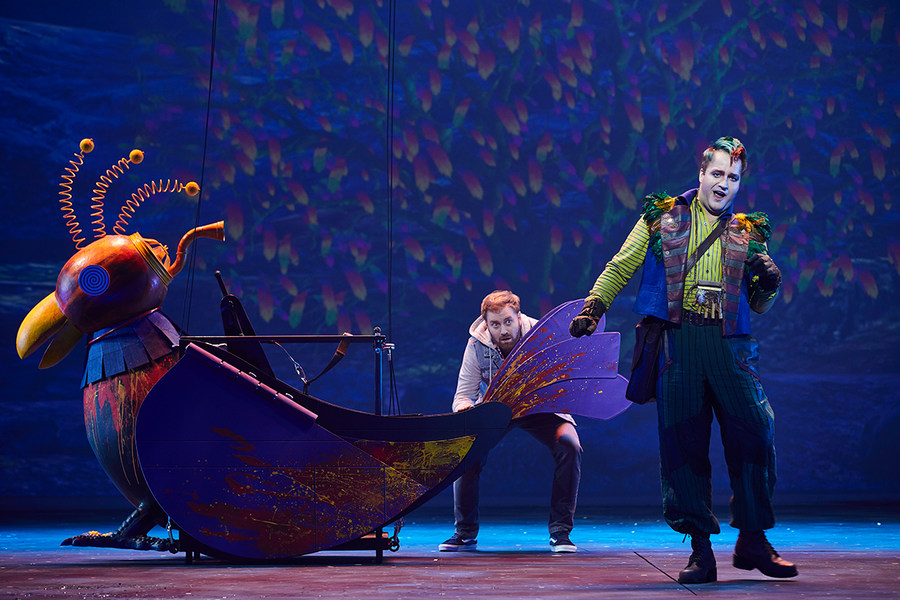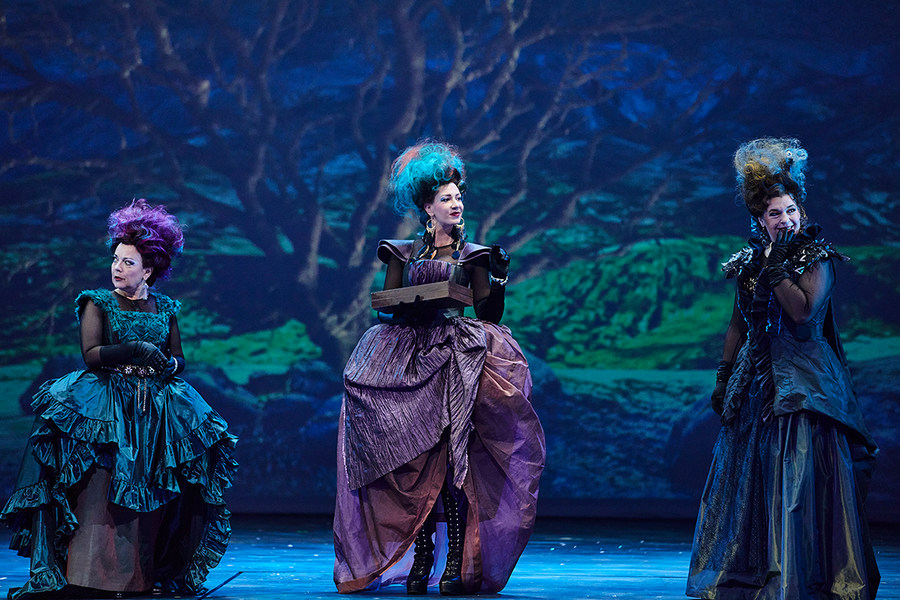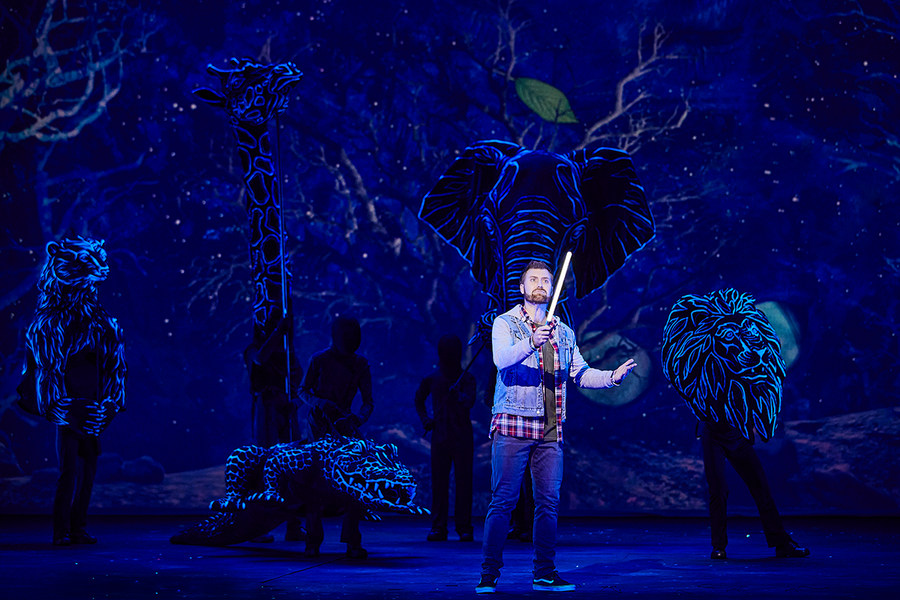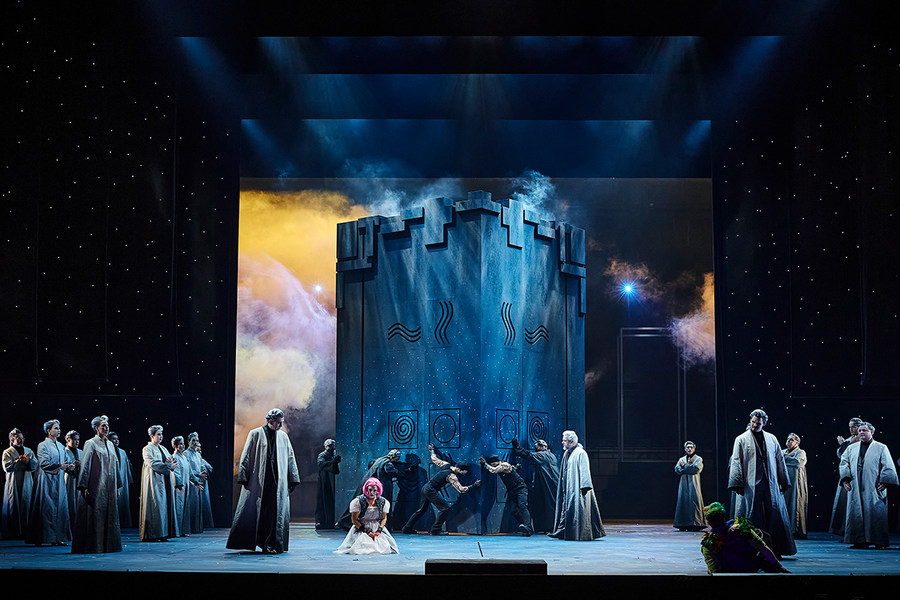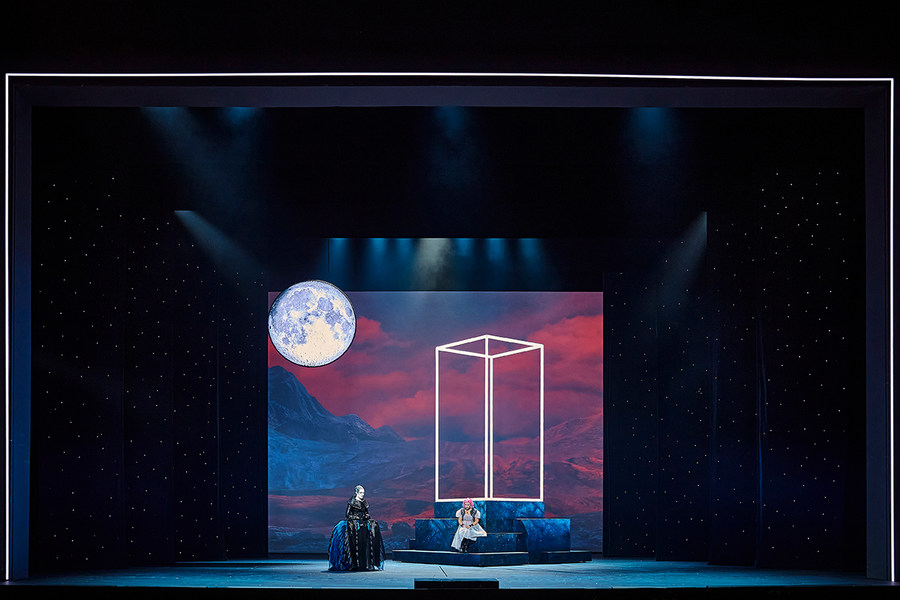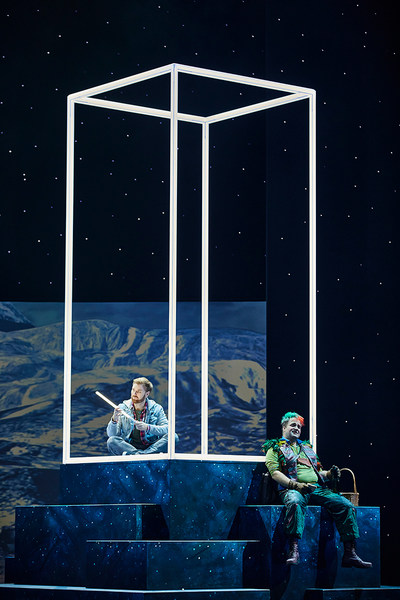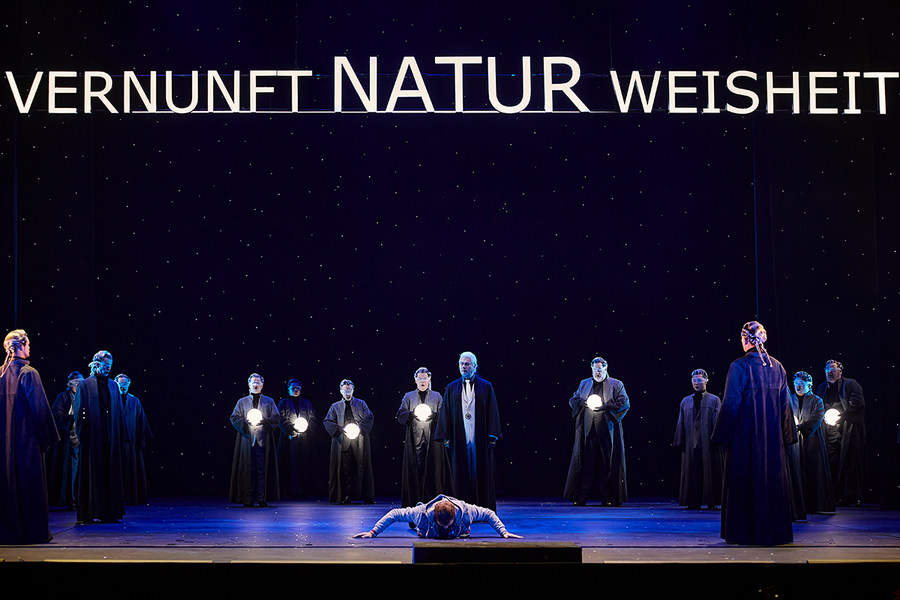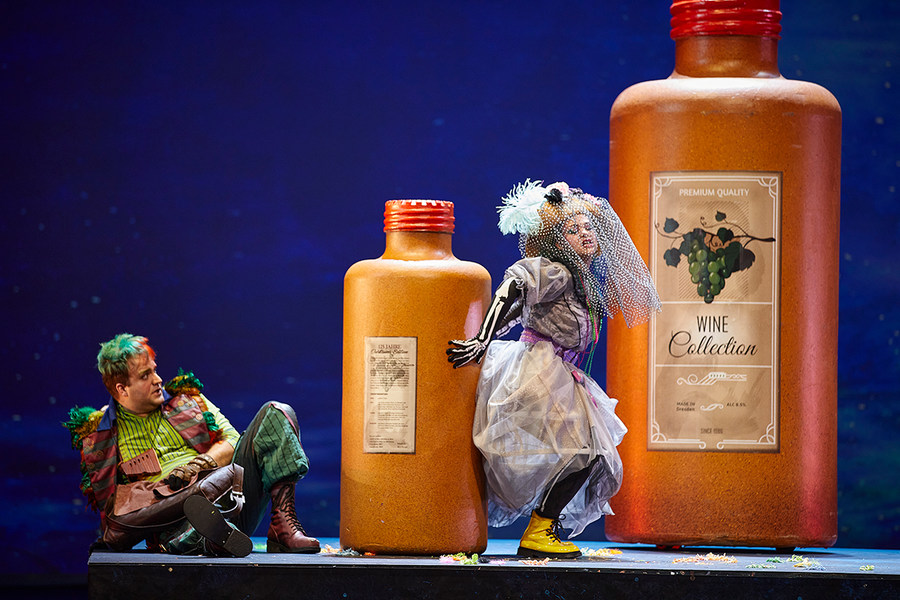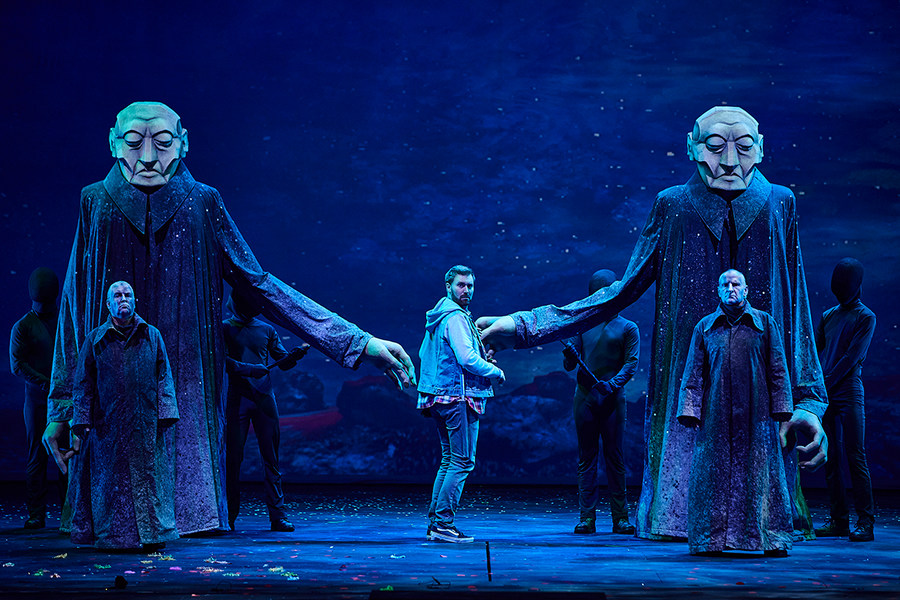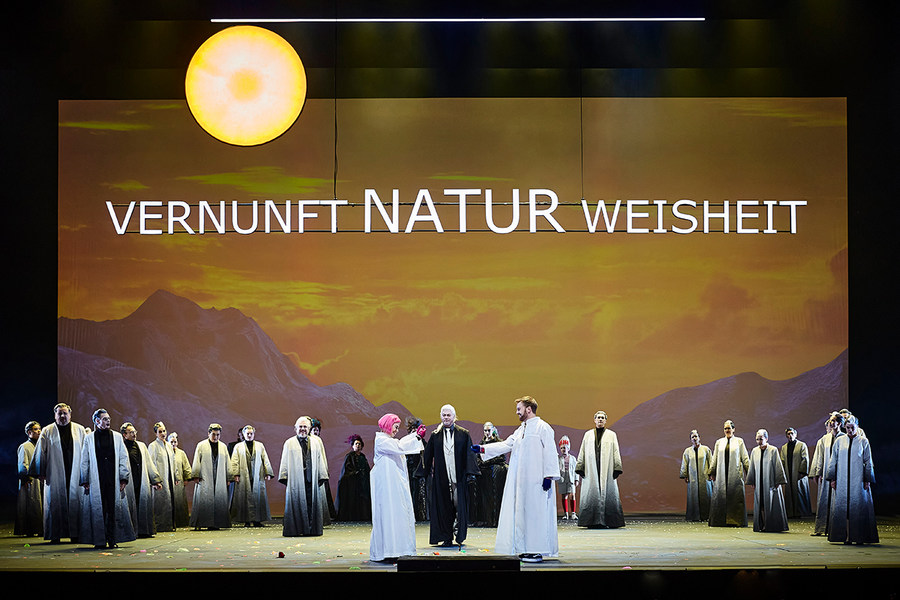Mozart’s most popular opera is a deeply humane story of adventure with heavenly music.
Opera in two acts
Libretto by Emanuel Schikaneder
Performed in German with German and English surtitles (Spoken dialogue is not translated word for word.)
Premiere
1. November 2020
Dates & Cast
- Conductor Katharina Müllner (07., 07., 21., 21. June, 04. July 2026), Giulio Cilona (11. February, 12. April, 02., 07. May 2026), Felix Krieger (24. April 2026)
- Staging Josef E. Köpplinger
- Set Design Walter Vogelweider
- Costume Design Dagmar Morell
- Lighting Design Fabio Antoci
- Choreography Ricarda Regina Ludigkeit
- Choir Jan Hoffmann
- Dramaturgy Johann Casimir Eule
- Sarastro Tobias Kehrer (24. April, 02. May, 07., 21. June, 04. July 2026), Georg Zeppenfeld (11. February, 12. April 2026), Anthony Robin Schneider (07., 21. June 2026)
- Königin der Nacht Maria Perlt-Gärtner (24. April, 07., 07., 21., 21. June, 04. July 2026), Alina Wunderlin (11. February, 12. April, 02., 07. May 2026)
- Pamina Magdalena Lucjan (04. July 2026), Liv Redpath (12., 24. April, 02. May 2026), Katharina Konradi (11. February, 07. May, 07., 21. June 2026), Louise McClelland Jacobsen (07., 21. June 2026)
- Tamino Mario Lerchenberger (11. February, 12., 24. April, 07., 21. June, 04. July 2026), James Ley (02., 07. May, 21. June 2026), Johan Krogius (07. June 2026)
- Papageno Danylo Matviienko (11. February, 04. July 2026), Sean Michael Plumb (12., 24. April, 02., 07. May 2026), Anton Beliaev (07., 21. June 2026)
- Erste Dame Roxana Incontrera (12., 24. April, 21. June, 04. July 2026), Elena Gorshunova (02., 07. May 2026), Natasha Gesto (07., 21. June 2026), Ute Selbig (11. February, 07. June 2026)
- Zweite Dame Sabine Brohm (11. February, 12., 24. April, 07., 21. June, 04. July 2026), Winona Martin (02., 07. May, 07., 21. June 2026)
- Dritte Dame Michal Doron (11. February, 21., 21. June, 04. July 2026), Christa Mayer (12., 24. April, 02. May 2026), Ekaterina Chayka-Rubinstein (07. May 2026)
- Monostatos Aaron Pegram (11. February, 12. April, 21. June, 04. July 2026), Jongwoo Hong (24. April, 02. May, 07., 21. June 2026), Timothy Oliver (07. May, 07. June 2026)
- Sprecher Markus Marquardt (07., 21. June, 04. July 2026), Alexander Grassauer (11. February, 12., 24. April 2026), Martin-Jan Nijhof (02., 07. May, 07., 21. June 2026)
- Papagena Christiane Hossfeld (11. February, 02., 07. May, 21. June, 04. July 2026), Dalia Medovnikov (12., 24. April, 07., 07., 21. June 2026)
- Erster Priester Metehan Köklü (11. February, 07., 21. June, 04. July 2026), David Roy (12., 24. April, 02., 07. May, 07., 21. June 2026)
- Zweiter Priester Jin Yu (21., 21. June, 04. July 2026), Jongwoo Hong (11. February, 12. April 2026), Gerald Hupach (24. April, 02., 07. May 2026), Simeon Esper (07., 07. June 2026)
- Erster Geharnischter Jürgen Müller (24. April, 02., 07. May, 07., 07., 21., 21. June, 04. July 2026), Gerald Hupach (11. February, 12. April 2026)
- Zweiter Geharnischter Matthias Henneberg
- Drei Knaben Tölzer Knabenchor (21., 21. June, 04. July 2026), Aurelius Sängerknaben Calw (11. February, 12., 24. April, 02. May 2026), Dresdner Kreuzchor (07. May, 07., 07. June 2026)
- Conductor Giulio Cilona
- Staging Josef E. Köpplinger
- Set Design Walter Vogelweider
- Costume Design Dagmar Morell
- Lighting Design Fabio Antoci
- Choreography Ricarda Regina Ludigkeit
- Choir Jan Hoffmann
- Dramaturgy Johann Casimir Eule
Sächsischer Staatsopernchor Dresden
Generously supported by the Stiftung Semperoper – Förderstiftung
- Sarastro Georg Zeppenfeld
- Königin der Nacht Alina Wunderlin
- Pamina Katharina Konradi
- Tamino Mario Lerchenberger
- Papageno Danylo Matviienko
- Erste Dame Ute Selbig
- Zweite Dame Sabine Brohm
- Dritte Dame Michal Doron
- Monostatos Aaron Pegram
- Sprecher Alexander Grassauer
- Papagena Christiane Hossfeld
- Erster Priester Metehan Köklü
- Zweiter Priester Jongwoo Hong
- Erster Geharnischter Gerald Hupach
- Zweiter Geharnischter Matthias Henneberg
- Drei Knaben Aurelius Sängerknaben Calw
- Conductor Giulio Cilona
- Staging Josef E. Köpplinger
- Set Design Walter Vogelweider
- Costume Design Dagmar Morell
- Lighting Design Fabio Antoci
- Choreography Ricarda Regina Ludigkeit
- Choir Jan Hoffmann
- Dramaturgy Johann Casimir Eule
Sächsischer Staatsopernchor Dresden
Generously supported by the Stiftung Semperoper – Förderstiftung
- Sarastro Georg Zeppenfeld
- Königin der Nacht Alina Wunderlin
- Pamina Liv Redpath
- Tamino Mario Lerchenberger
- Papageno Sean Michael Plumb
- Erste Dame Roxana Incontrera
- Zweite Dame Sabine Brohm
- Dritte Dame Christa Mayer
- Monostatos Aaron Pegram
- Sprecher Alexander Grassauer
- Papagena Dalia Medovnikov
- Erster Priester David Roy
- Zweiter Priester Jongwoo Hong
- Erster Geharnischter Gerald Hupach
- Drei Knaben Aurelius Sängerknaben Calw
- Conductor Felix Krieger
- Staging Josef E. Köpplinger
- Set Design Walter Vogelweider
- Costume Design Dagmar Morell
- Lighting Design Fabio Antoci
- Choreography Ricarda Regina Ludigkeit
- Choir Jan Hoffmann
- Dramaturgy Johann Casimir Eule
Sächsischer Staatsopernchor Dresden
Generously supported by the Stiftung Semperoper – Förderstiftung
- Sarastro Tobias Kehrer
- Königin der Nacht Maria Perlt-Gärtner
- Pamina Liv Redpath
- Tamino Mario Lerchenberger
- Papageno Sean Michael Plumb
- Erste Dame Roxana Incontrera
- Zweite Dame Sabine Brohm
- Dritte Dame Christa Mayer
- Monostatos Jongwoo Hong
- Sprecher Alexander Grassauer
- Papagena Dalia Medovnikov
- Erster Priester David Roy
- Zweiter Priester Gerald Hupach
- Erster Geharnischter Jürgen Müller
- Drei Knaben Aurelius Sängerknaben Calw
- Conductor Giulio Cilona
- Staging Josef E. Köpplinger
- Set Design Walter Vogelweider
- Costume Design Dagmar Morell
- Lighting Design Fabio Antoci
- Choreography Ricarda Regina Ludigkeit
- Choir Jan Hoffmann
- Dramaturgy Johann Casimir Eule
Sächsischer Staatsopernchor Dresden
Generously supported by the Stiftung Semperoper – Förderstiftung
- Sarastro Tobias Kehrer
- Königin der Nacht Alina Wunderlin
- Pamina Liv Redpath
- Tamino James Ley
- Papageno Sean Michael Plumb
- Erste Dame Elena Gorshunova
- Zweite Dame Winona Martin
- Dritte Dame Christa Mayer
- Monostatos Jongwoo Hong
- Sprecher Martin-Jan Nijhof
- Papagena Christiane Hossfeld
- Erster Priester David Roy
- Zweiter Priester Gerald Hupach
- Erster Geharnischter Jürgen Müller
- Zweiter Geharnischter Matthias Henneberg
- Drei Knaben Aurelius Sängerknaben Calw
- Conductor Giulio Cilona
- Staging Josef E. Köpplinger
- Set Design Walter Vogelweider
- Costume Design Dagmar Morell
- Lighting Design Fabio Antoci
- Choreography Ricarda Regina Ludigkeit
- Choir Jan Hoffmann
- Dramaturgy Johann Casimir Eule
Sächsischer Staatsopernchor Dresden
Generously supported by the Stiftung Semperoper – Förderstiftung
- Königin der Nacht Alina Wunderlin
- Pamina Katharina Konradi
- Tamino James Ley
- Papageno Sean Michael Plumb
- Erste Dame Elena Gorshunova
- Zweite Dame Winona Martin
- Dritte Dame Ekaterina Chayka-Rubinstein
- Monostatos Timothy Oliver
- Sprecher Martin-Jan Nijhof
- Papagena Christiane Hossfeld
- Erster Priester David Roy
- Zweiter Priester Gerald Hupach
- Erster Geharnischter Jürgen Müller
- Zweiter Geharnischter Matthias Henneberg
- Drei Knaben Dresdner Kreuzchor
- Conductor Katharina Müllner
- Staging Josef E. Köpplinger
- Set Design Walter Vogelweider
- Costume Design Dagmar Morell
- Lighting Design Fabio Antoci
- Choreography Ricarda Regina Ludigkeit
- Choir Jan Hoffmann
- Dramaturgy Johann Casimir Eule
Sächsischer Staatsopernchor Dresden
Generously supported by the Stiftung Semperoper – Förderstiftung
- Sarastro Anthony Robin Schneider
- Königin der Nacht Maria Perlt-Gärtner
- Pamina Louise McClelland Jacobsen
- Tamino Mario Lerchenberger
- Papageno Anton Beliaev
- Erste Dame Natasha Gesto
- Zweite Dame Sabine Brohm
- Monostatos Timothy Oliver
- Sprecher Martin-Jan Nijhof
- Papagena Dalia Medovnikov
- Erster Priester Metehan Köklü
- Zweiter Priester Simeon Esper
- Erster Geharnischter Jürgen Müller
- Drei Knaben Dresdner Kreuzchor
In brief

In answer to Tamino’s question about who he is, Papageno says »A man like you«. Tamino’s reply to the counter-question is that he comes from »princely blood«. Thus it is clear from the word go that while the bird-catcher Papageno has true humanity, this is something still lacking in Tamino. While this goal is truly noble, the pathway to achieving it is humorous, playful and, one could say, humane. As described by the libretto, the protagonists undergo various trials, encounter hell’s vengeance and the sweetest love, meet dancing animals and child-spirits, until Tamino and Pagageno finally reach their happy goal. On the one hand, Wolfgang Amadeus Mozart’s last opera »The Magic Flute«, which premiered in Vienna in 1791, follows the venerable tradition of Viennese magical theatre.
On the other hand, Mozart and his librettist Emanuel Schikaneder were also inspired by the Enlightenment ideas of the Freemasons to create a blend of crazy buffoonery and Masonic symbolism, striking misogyny and the deepest humanity, all infused with heavenly music. These elements make »The Magic Flute« the successful opera that has been enjoyed by each generation and is still beloved today.
Storyline
Act one
Prince Tamino is being pursued by a wild serpent. At the last minute, he is saved by three mysterious ladies who have been sent by the queen of the night. When the bird catcher Papageno appears and boasts about the heroic deed they punish him. In contrast, they give the prince a portrait of Pamina, the daughter of the queen who is being held captive by the ruler of the temple of the sun, Sarastro. Tamino falls in love with her. The queen appears in person and orders him to rescue Pamina together with Papageno. A magic flute will protect him from any danger whilst a reluctant Papageno is given magic bells. Guided by three young boys, they set off on their way to Sarastro’s temple. Whilst the temple guards tell Tamino that Sarastro is not the evil tyrant that the queen has depicted, Papageno finds Pamino and tries to flee with her. With the help of the chimes, he is able to distract her guard Monostatos although his efforts are scuppered by the appearance of Sarastro. Papageno, Pamina and Tamino have to stay in Sarastro’s kingdom as Sarastro has something greater planned for Tamino: just as he has taken Pamina into his kingdom to protect her from her mother, he plans to get Tamino into his circle of insiders of the sun temple and, in this way, prepare him for future tasks.
Act two
Tamino and Papageno are challenged to undergo various trials to prove that they are fit to be accepted into the circle of insiders. Firstly, they have to learn to remain silent which is difficult, particularly for Papageno. When an elderly woman appears, he is unable to keep this up and asks her what her name is. She then disappears with a clap of thunder. Papageno comforts himself with food and drink which is miraculously served to them both. Only Tamino remains silent and plays his flute for solace. Pamina appears but cannot understand why Tamino is no longer speaking to her. Her mother – the queen of the night – had previously tried in vain to persuade her to murder Sarastro. When, in her despair, she tries to take her life, the three young boys snatch the dagger away from her and lead her back to Tamino. Together they face the final test, the fire and water challenge. Protected by the magic sounds of the flute, they pass the test. Meanwhile, Papageno, in his loneliness, wishes that the elderly lady reappears and promises her that he will take her as his wife “as long as he doesn’t find anyone better”. She then transforms into a beautiful young girl but is taken away from him as the time has not yet come. Out of despair, Papageno wants to take his life but the three young boys remind him of the bells. The sound makes Papagena appear and both dream of a future with many children. The other couple is also happy: Tamino and Pamina, as future rulers, are accepted into the group of insiders and glorify the ideals of nature, wisdom and reason. Only the queen of the night comes to a bad ending: when she tries to enter the temple with her entourage, she is engulfed by the powers of darkness.
Explore
The Magic Flute
